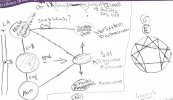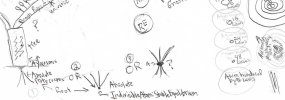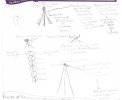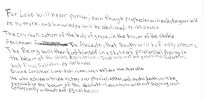Roland J. Prather
Jedi
I won’t quote everything here but reading through chapter XIII of Gnosis, Book One pg. 115-119. I wonder if my understanding of this is received correctly I do have several question:
From Gnosis Book One, pg.116
“Our perception of time varies. This is true in two ways: it varies from one person to another and, for each person, it varies with his physical or mental condition. The influence of age, health and emotional state are well enough known. Besides these general examples, there exist particular cases where the disappearance of time is complete: for example, during dreamless sleep, a brief loss of consciousness, or under general anesthesia. The loss of the notion of time in such cases is due to physiological causes. But time can also be made to disappear by voluntary, conscious effort, especially an effort of concentration. By practicing the latter assiduously, we observe this phenomenon from the very first exercises. As we intensify our concentration more and more, we perceive time less and less. If, by methodical and sustained effort, we manage to eliminate everything from our field of observation apart from physical or moral object on which we concentrate, and if, in addition, we are able to hold this fixed attention on a single point—which gives birth to contemplation—time entirely(‘integralement’.) disappears. Conversely the more man’s attention is dispersed, the more time drags for him.”
This phenomenon is objective in itself. It is a law. Its reason for being— as well as the mechanism by which it works – will be explained later in the Doctrine of the Present.
It is interesting to point out another phenomenon: our ability to modify the rate of our own perception of time. This happens many times every day. We pay no attention to it, because this phenomenon occurs mechanically on a small scale. But it can also be produced voluntarily on a much larger scale.
A tennis champion told us when he retrieved a particularly difficult bal during a match, he suddenly saw it coming towards him in slow motion. So slowly that he had unlimited time to judge the situation, take a correct decision, and finally return the ball by a masterly shot which aroused the admiration of the experts.” End quote
So thinking:
Is it the more a man identifies with his surroundings or makes identifications the more his attention is dispersed and he becomes more dense in his make-up or subjective and weighed down by the bondage of time? If man can speed up his vibratory rate (atoms?) to a higher frequency, time has less and less of an influence on him or he moves into another time frame govern by less laws of the cosmos?
Is he able to receive or be present with more higher impressions that are always there constantly which to man 123 is at 0.0001 seconds of hydrogen 12?
So if man can focus his attention voluntarily by conscious efforts, concentration he will perceive time less and less. So it’s not that 0.0001 seconds of impressions seems too quick to grasp but that by man 123 perception of time or by the laws of his constrained time permit him only to view things as passing to quick or slow he is closed off in a cycle which he experiences most of his existence of quick birth and death, kind of taken on a ride by the indifference of time an apathy to his suffering; a quote comes to mind by Plato(Life's tragedy is that we get old too soon and wise too late)?
Man’s microcosms is that of 24hrs his breath is that of 3 seconds he is limited in perception by the unit of time and thus his understanding of 99.999 percent of everything he perceives or take in is subjective, incomplete by default or that he takes in more of organic life then of higher mental impressions by which higher knowing escapes him by his seemingly passage of time in waking sleep,?
That Man’s reading error of his instrument which is suitable for organic life that his measurement is govern by the relative capacity of the given units of time . For example: A person looking through binoculars would perceive another object or person up close to him so as to give the perception to even touch or read the finite details of a rock or the words on the persons t-shirt; that the perception of the binocular (now utilized as a reading instrument) cuts the distance between what is being perceived and the perceiver. But when the binocular is taken away the object or person is far away giving distance or time the dominating factor and limiting the perceivers scope of information or details also limiting his probability for seeing possibilities or into the future?.
So is relativity the perception of Time or perceiving within a given cycle of time constituted by its laws? As each cosmos has its 3 dimensional time frames but have different laws of acting on it that gives rise to several cycles of birth and death govern by its particular laws? Can cycles be the mediator between time and the continuing of the universe? That without cycles time could put an end to the Universe? By which time does not give the Universe its maximum achievement.
Is quantum entanglement the perceivers dispersion of focus or lack thereof gives entanglement of probabilities and that only with conscious effort of concentration does something collapses up to the given capacity of a reading instrument?
A side question I thought about is the Atom
So Absolute (Protocosmos, 1 ), The atom at the level of All Worlds(Aghiocosmos 3 laws), An atom of the milky way (Megalocosmos 6 laws), An atom of the Sun (Deuterocosmos 12 laws), An atom of the Planetary World ( Mesocosmos 24 laws), An atom of the planet Earth (Tritocosmos 48 laws), An Atom of the Moon (Tessaracomos 96 groups of laws).
If the Atom descends from the Absolute ( the atom of the Absolute: the only indivisible atom) from that point, into the Rays of Creation where laws are in existence and categorically in place, the macrocosms continuing to the microcosms gives the atom less and less of its expression and probability at each given level ? So the human is govern by 48 groups of laws perceiving an Atom as incomplete or more precisely the Atom retains its fullness but that its creative expression is limited or weighed by the 48 laws and our own limited reading instrument influenced by these laws also gives the perception to what we now think is all the make up to an Atom?
From Gnosis Book One, pg.116
“Our perception of time varies. This is true in two ways: it varies from one person to another and, for each person, it varies with his physical or mental condition. The influence of age, health and emotional state are well enough known. Besides these general examples, there exist particular cases where the disappearance of time is complete: for example, during dreamless sleep, a brief loss of consciousness, or under general anesthesia. The loss of the notion of time in such cases is due to physiological causes. But time can also be made to disappear by voluntary, conscious effort, especially an effort of concentration. By practicing the latter assiduously, we observe this phenomenon from the very first exercises. As we intensify our concentration more and more, we perceive time less and less. If, by methodical and sustained effort, we manage to eliminate everything from our field of observation apart from physical or moral object on which we concentrate, and if, in addition, we are able to hold this fixed attention on a single point—which gives birth to contemplation—time entirely(‘integralement’.) disappears. Conversely the more man’s attention is dispersed, the more time drags for him.”
This phenomenon is objective in itself. It is a law. Its reason for being— as well as the mechanism by which it works – will be explained later in the Doctrine of the Present.
It is interesting to point out another phenomenon: our ability to modify the rate of our own perception of time. This happens many times every day. We pay no attention to it, because this phenomenon occurs mechanically on a small scale. But it can also be produced voluntarily on a much larger scale.
A tennis champion told us when he retrieved a particularly difficult bal during a match, he suddenly saw it coming towards him in slow motion. So slowly that he had unlimited time to judge the situation, take a correct decision, and finally return the ball by a masterly shot which aroused the admiration of the experts.” End quote
So thinking:
Is it the more a man identifies with his surroundings or makes identifications the more his attention is dispersed and he becomes more dense in his make-up or subjective and weighed down by the bondage of time? If man can speed up his vibratory rate (atoms?) to a higher frequency, time has less and less of an influence on him or he moves into another time frame govern by less laws of the cosmos?
Is he able to receive or be present with more higher impressions that are always there constantly which to man 123 is at 0.0001 seconds of hydrogen 12?
So if man can focus his attention voluntarily by conscious efforts, concentration he will perceive time less and less. So it’s not that 0.0001 seconds of impressions seems too quick to grasp but that by man 123 perception of time or by the laws of his constrained time permit him only to view things as passing to quick or slow he is closed off in a cycle which he experiences most of his existence of quick birth and death, kind of taken on a ride by the indifference of time an apathy to his suffering; a quote comes to mind by Plato(Life's tragedy is that we get old too soon and wise too late)?
Man’s microcosms is that of 24hrs his breath is that of 3 seconds he is limited in perception by the unit of time and thus his understanding of 99.999 percent of everything he perceives or take in is subjective, incomplete by default or that he takes in more of organic life then of higher mental impressions by which higher knowing escapes him by his seemingly passage of time in waking sleep,?
That Man’s reading error of his instrument which is suitable for organic life that his measurement is govern by the relative capacity of the given units of time . For example: A person looking through binoculars would perceive another object or person up close to him so as to give the perception to even touch or read the finite details of a rock or the words on the persons t-shirt; that the perception of the binocular (now utilized as a reading instrument) cuts the distance between what is being perceived and the perceiver. But when the binocular is taken away the object or person is far away giving distance or time the dominating factor and limiting the perceivers scope of information or details also limiting his probability for seeing possibilities or into the future?.
So is relativity the perception of Time or perceiving within a given cycle of time constituted by its laws? As each cosmos has its 3 dimensional time frames but have different laws of acting on it that gives rise to several cycles of birth and death govern by its particular laws? Can cycles be the mediator between time and the continuing of the universe? That without cycles time could put an end to the Universe? By which time does not give the Universe its maximum achievement.
Is quantum entanglement the perceivers dispersion of focus or lack thereof gives entanglement of probabilities and that only with conscious effort of concentration does something collapses up to the given capacity of a reading instrument?
A side question I thought about is the Atom
So Absolute (Protocosmos, 1 ), The atom at the level of All Worlds(Aghiocosmos 3 laws), An atom of the milky way (Megalocosmos 6 laws), An atom of the Sun (Deuterocosmos 12 laws), An atom of the Planetary World ( Mesocosmos 24 laws), An atom of the planet Earth (Tritocosmos 48 laws), An Atom of the Moon (Tessaracomos 96 groups of laws).
If the Atom descends from the Absolute ( the atom of the Absolute: the only indivisible atom) from that point, into the Rays of Creation where laws are in existence and categorically in place, the macrocosms continuing to the microcosms gives the atom less and less of its expression and probability at each given level ? So the human is govern by 48 groups of laws perceiving an Atom as incomplete or more precisely the Atom retains its fullness but that its creative expression is limited or weighed by the 48 laws and our own limited reading instrument influenced by these laws also gives the perception to what we now think is all the make up to an Atom?








